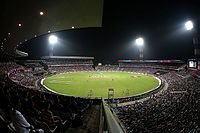
Photo from wikipedia
OBJECTIVES Determine intra-individual changes in CogSport performance in elite cricket players diagnosed with concussion, and differentiate this from changes which may be attributed to post-match with no head impact. DESIGN… Click to show full abstract
OBJECTIVES Determine intra-individual changes in CogSport performance in elite cricket players diagnosed with concussion, and differentiate this from changes which may be attributed to post-match with no head impact. DESIGN Retrospective observational study of elite Australian male and female cricket players with diagnosed concussion and prospective cohort study of cricket players with no head impact post-match. METHODS CogSport performance relative to an individual's baseline was compared between 46 cricket players diagnosed with concussion following a head impact sustained during a match, and 84 cricket players who played a match during which they had no head impact. RESULTS CogSport performance post-match for players diagnosed with concussion was slower for detection speed (p < 0.001), identification speed (p = 0.007), and one back speed (p = 0.011). No changes in one card learning speed or any accuracy measures were observed. CogSport performance post-match with no head impact was faster but less accurate for one card learning (both p < 0.001). No changes in the other three test components were observed. CONCLUSIONS Slower performance in three of four CogSport tasks (detection, identification, one back) may be indicative of concussion, as these intra-individual changes were not observed in players post-match with no head impact. The fourth task, one card learning, may not be a useful indicator of concussion as it was not observed to change with concussion yet was susceptible to change post-match with no head impact. CogSport may have clinical utility in assisting the clinical diagnosis of concussion in elite male and female cricket players.
Journal Title: Journal of science and medicine in sport
Year Published: 2020
Link to full text (if available)
Share on Social Media: Sign Up to like & get
recommendations!